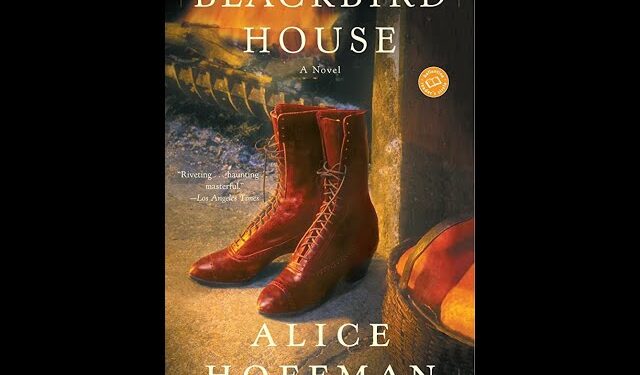Table of Contents
ToggleIntroduction
Blackbird House Summary And Themes By Alice Hoffman In Alice Hoffman’s novel Blackbird mansion, the lives of multiple people are interwoven through the prism of a single, enigmatic mansion located on the Massachusetts coast. Throughout the story, the house—dubbed “Blackbird House” after the local blackbirds—acts as a literal and metaphorical anchor.
The book tells tales that unite generations, families, and lovers over a period of more than two centuries. Blackbird House examines issues of love, loss, fate, and time passing via Hoffman’s distinctively poetic style. In addition to discussing the distinct pasts of its protagonists, the book also discusses how locations may mold lives by leaving memories and affecting the paths taken by subsequent generations.
Hoffman, who is well-known for her magical realism and profound emotional understanding, weaves historical events into a symbolic story. Blackbird House explores the human condition through its depiction of strong, occasionally tragic lives. It talks about resiliency, family, and the enduring desire for connection.
Plot Summary
The structure of Blackbird House consists of a sequence of interrelated stories that span several generations and are all connected by the house that serves as the title. The story starts in the early nineteenth century and goes on to the present.
1. The Origins of the House:
The novel opens with the story of a woman named Hannah in the early 1800s. She is a young widow who inherits the property of Blackbird House after the death of her husband. Hannah, who comes from a family with a tragic history, moves to the house seeking solitude and peace. The house itself is surrounded by the wild beauty of nature, with blackbirds being an important motif throughout the story, symbolizing both freedom and loss.
In the first section, the novel traces Hannah’s life as she begins to rebuild herself in the solitude of her new home. She finds solace in her connection to the land and the creatures surrounding her, particularly the blackbirds. However, she is haunted by her past, especially by her unresolved grief over the death of her husband, and her journey becomes one of healing and reconciliation.
2. The House as a Witness to History:
As the narrative moves forward through the years, it introduces new characters who come to live at or near Blackbird House. These include Bea, a woman from the early 20th century, whose life is marked by a love affair that alters the course of her life. Bea’s tale is one of heartache, as she struggles with societal expectations and the complexities of love and desire. Her story is both poignant and tragic, a reflection of the emotional turmoil many women faced in a time of limited autonomy.
The house serves as a silent witness to all the emotional upheavals in the lives of its residents. Over the years, it harbors stories of passion, regret, and moments of quiet reflection. The house itself, though physically standing firm, is also shaped by these stories, accumulating layers of memory and emotional weight as time passes. Its walls absorb the joys and sorrows of those who come and go, adding to its significance as both a setting and a symbol.
3. Generations of Love and Loss:
The narrative continues to unfold across generations, moving through the 20th century and into the modern day. One of the key figures in these later stories is Sylvia, a woman who returns to Blackbird House as an adult, seeking to understand her own place in the world and in the legacy of the people who have lived there. Sylvia’s story is one of reconciling with the past, understanding the intricacies of family bonds, and forging her own identity.
Another important character is Charlie, a young boy who spends summers at Blackbird House. Charlie’s time at the house is marked by a series of formative experiences that shape his understanding of love, loss, and family. The house, as seen through his eyes, becomes a sanctuary but also a place filled with unresolved emotions. It is here that he begins to grapple with the complexities of the world around him, learning lessons about the fragility of life and the strength found in family connections.
Read more
4. The Legacy of Blackbird House:
As the years pass and generations of families are impacted by the house and its surroundings, the novel ultimately explores the notion of legacy—the ways in which the past can shape the present, and how the choices we make influence those who come after us. Through the intertwining lives of its characters, Blackbird House reveals the cyclical nature of history, the importance of family and place, and the emotional inheritance passed down from one generation to the next.
The house, which has withstood the test of time, is a testament to the power of physical places to store memories and feelings, serving as conduits for the tales of their occupants. The novel’s conclusion gives readers a sense of the persistence of the human experience—how the past shapes our lives, how we never stop looking for purpose, and how the relationships we create endure.

Themes in Blackbird House
1 Love and Loss: A central theme in Blackbird House is the powerful, often painful nature of love and loss. Whether it is Hannah’s quiet mourning for her husband, Bea’s tragic romance, or Sylvia’s struggles with family, the novel illustrates how love can shape the course of one’s life, often in ways that are unpredictable or painful. At the same time, the novel explores the idea that loss, although painful, is an inherent part of the human experience. The characters in the book learn that love, in all its forms, carries the potential for both deep joy and profound sorrow.
2 The Passage of Time: Another key theme is the passage of time and its effect on people, places, and memories. The novel spans over two hundred years, and with each generation, readers witness the subtle yet profound shifts that occur in both the personal and historical spheres. The changes in the characters’ lives are often tied to larger societal movements—war, social change, and shifting gender roles—and the novel reflects how individuals are shaped by the eras they live in. The house itself also becomes a symbol of time, standing through the generations and absorbing the weight of the past.
3 Connection to Place: Blackbird House underscores the idea that places are more than just physical locations—they are imbued with memories and emotions. The house, situated on the Massachusetts coastline, is not only a home but a powerful symbol of the characters’ emotional landscapes. The natural world surrounding the house—the birds, the land, and the ocean—becomes a source of solace, inspiration, and sometimes even foreboding. Hoffman uses the setting to reflect the inner lives of her characters, showing how their connections to the house and its surroundings shape their identities and decisions.
4 Family and Legacy: The concept of family and legacy is deeply explored in the novel, with many of the characters grappling with the influence of their parents and ancestors. The novel shows how family dynamics can be both nurturing and stifling, and how the ties that bind us to our lineage are often both a source of strength and of conflict. In Blackbird House, the lives of multiple generations are woven together, revealing how the past reverberates in the present and how the choices of one generation influence the next.
Read more
5 Fate and Free Will: A recurring theme in Blackbird House is the tension between fate and free will. Characters often find themselves in circumstances that seem beyond their control, yet they also make choices that lead to significant personal growth or hardship. The novel examines how characters navigate the forces of destiny and personal agency, suggesting that while fate may play a role in their lives, their actions and decisions ultimately shape their futures.
6 Isolation and Solitude: Several of the characters in Blackbird House experience feelings of isolation and solitude, either by choice or by circumstance. Hannah, the original owner of Blackbird House, seeks solace in her solitude after the death of her husband. Bea’s romantic struggles and Sylvia’s journey to find herself also bring them into moments of solitude. Hoffman explores the emotional complexities of loneliness, illustrating that it can be both a source of pain and a catalyst for self-reflection and growth.

Conclusion
Themes of love, sorrow, memory, and legacy are all interwoven in the incredibly moving book Blackbird House. Through two centuries of exquisite narrative, Alice Hoffman explores how time, place, and family impact the lives of people who interact with Blackbird House. Hoffman offers a moving meditation on the human condition through the interwoven tales of its characters, giving readers insight into the significance of location, the passing of time, and the emotional nuances that shape our bonds with one another. The book is proof of the persistent human need for understanding, connection, and purpose in a world that is changing all the time.
Read more
(FAQ)
1. What is the significance of the house in Blackbird House?
The house itself serves as both a physical and symbolic anchor in the novel. It is a place where the lives of multiple generations intersect, holding memories, both joyful and painful. The house represents the continuity of human experience, while also acting as a witness to the passing of time and the evolving lives of its inhabitants. It becomes a metaphor for family, legacy, and the impact of place on personal identity.
2. Is Blackbird House a magical realism novel?
While Blackbird House contains elements of magical realism, particularly in its symbolic use of nature and the house as a living presence, it is more grounded in the emotional and psychological experiences of its characters. The novel’s magic lies in its portrayal of deep, often unspoken connections between people, places, and memories.
3. How does the passage of time affect the characters in the novel?
The novel spans over two hundred years, and the passage of time is a central theme. As time moves forward, the characters evolve, experiencing personal growth, loss, and change. The house stands as a constant, absorbing the emotional weight of each generation. Time shapes the characters’ identities, relationships, and decisions, and the novel illustrates how the past continues to influence the present.
4. What role does nature play in the story?
Nature, particularly the blackbirds and the landscape surrounding the house, plays a significant role in the novel. The natural world is a source of solace and inspiration for the characters, providing both a backdrop for their personal journeys and a symbol of freedom, beauty, and inevitability. The birds themselves, in particular, are a recurring motif representing both life’s fleeting nature and the continuity of existence.
5. How does Blackbird House explore themes of family and legacy?
The novel explores the ways in which family and legacy shape individuals. Many of the characters are affected by the choices and histories of their ancestors, and the book delves into the complexities of family dynamics—love, conflict, and connection. Through multiple generations, Blackbird House illustrates the deep impact that family, heritage, and inheritance have on personal identity and relationships.
















